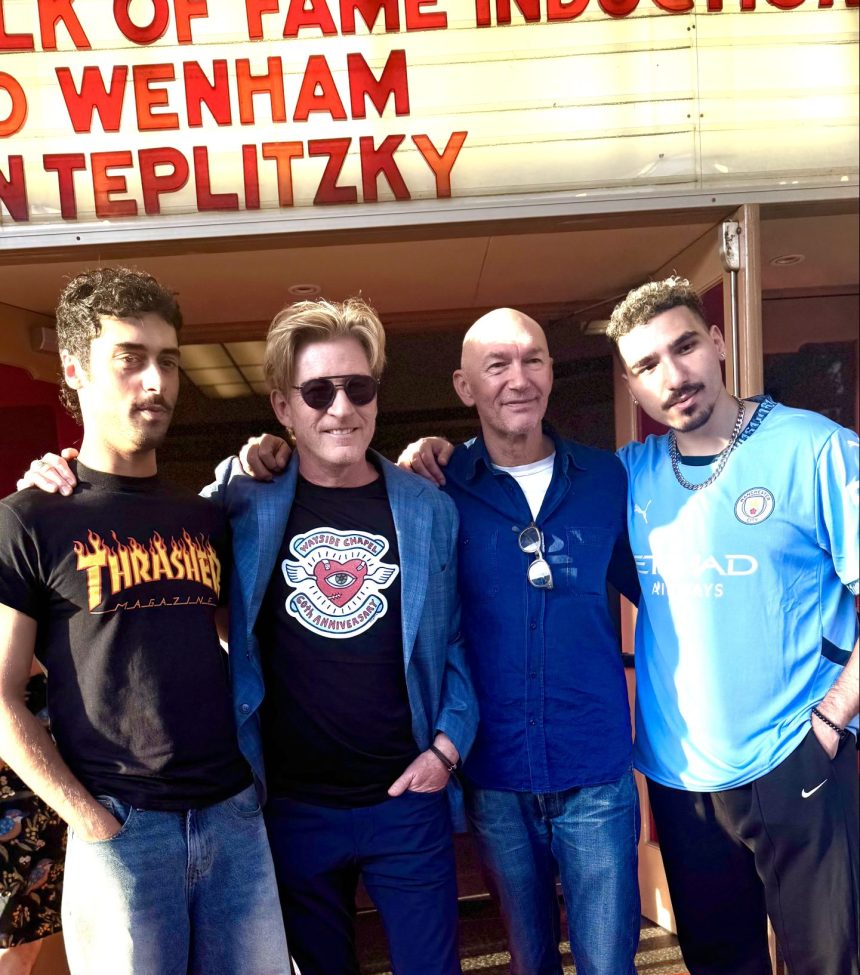Irresistible sat down with David Wenham and his suitcase of modesty to unpack the iconic actor’s brilliant career, his latest iteration of Johnny (Spit) Spitieri, the famous mullet, and the thrill of being inducted into the Australian Film Walk of Fame this week. We touched on mateship, community, and his love for the big screen experience.
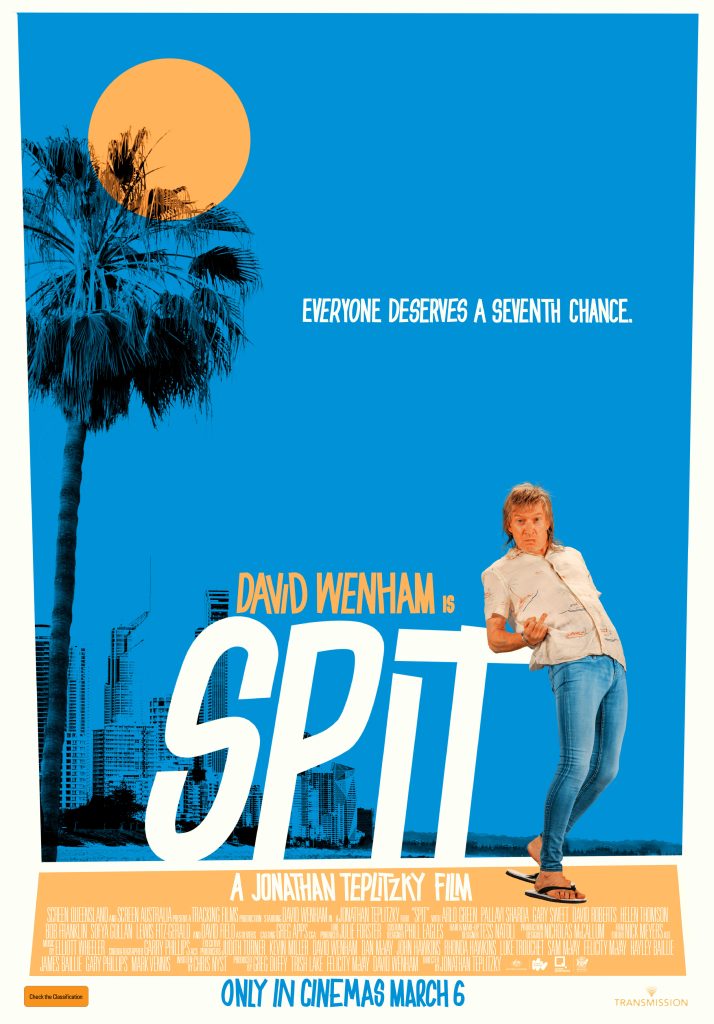
SPIT is the new comedy starring and produced by David Wenham, and sees the return of the iconic Australian character Johnny (Spit) Spitieri, from the same award-winning team behind Gettin’ Square. It will be out in cinemas March 6, 2025, and follows small-time ex-criminal Spit’s journey, as he slips back into Australia on a false passport after 20 years on the run, only to find himself locked up in an Immigration Detention Centre with a massive target on his back.
David Wenham, with filmmakers and other cast members, has already started a national Q&A screening tour, taking in Brisbane, Toowoomba, Maroochydore, Townsville, Cairns, Sydney, Avoca Beach, Newcastle, Wollongong, Hobart and Adelaide, amongst plenty of other locations.
Wenham is being celebrated with a plaque on the Australian Film Walk of Fame to acknowledge his contribution to Australian cinema. Irresistible was there for the grand unveiling, presided over by Randwick City Mayor Dylan Parker, and hosted by Randwick City Council.
The Australian Film Walk of Fame honours the significant contributions of Australian actors and directors to the local industry with a permanent plaque on the footpath outside The Ritz Cinema in Randwick. Past luminaries include Leah Purcell, Sigrid Thornton, Deborah Mailman, Michael Caton and Jack Thompson AM, amongst many others.
We also spoke to Mayor Parker about the famous strip, and what Wenham’s career and Australian cinema means to him.
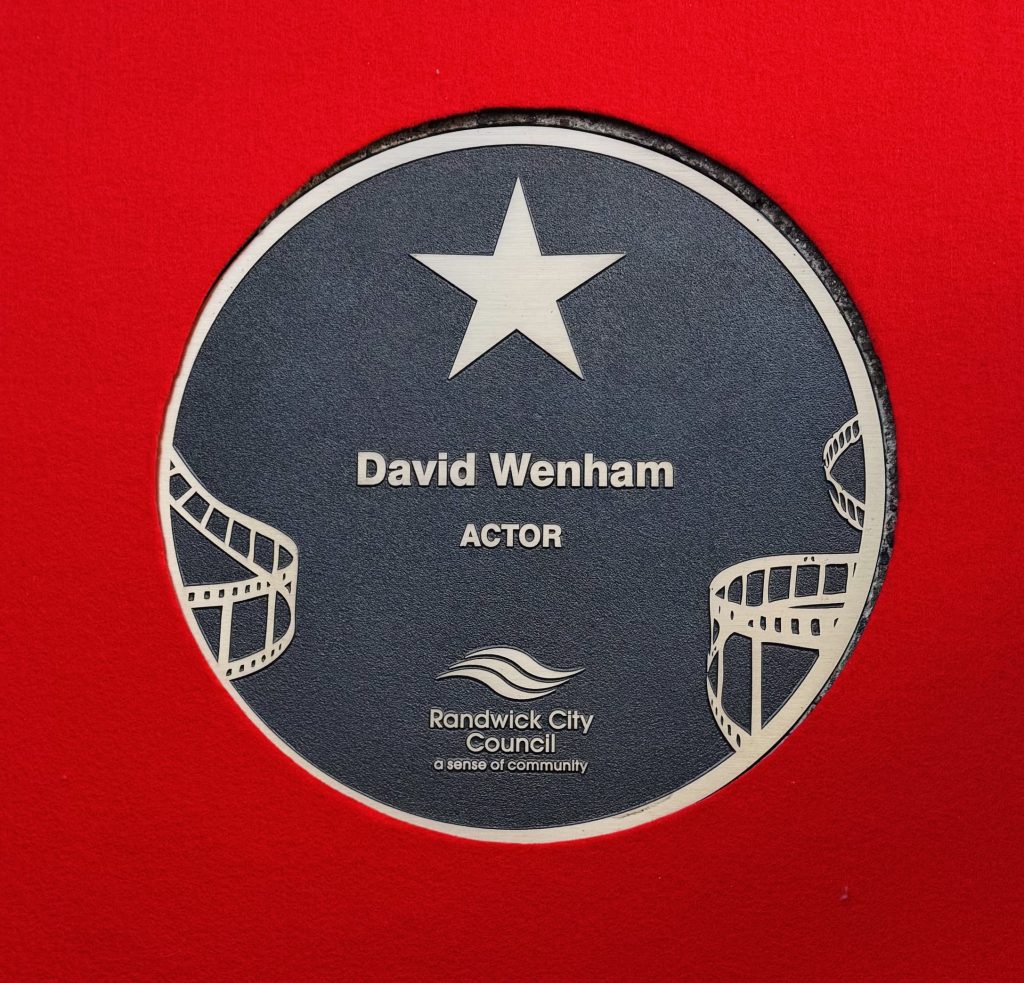
What shone through both in the interview and the Film Walk of Fame event, was Wenham’s love for community and helping others. He’s deeply committed to, and an Ambassador for, The Wayside Chapel. When we asked CEO and Pastor of Wayside Jon Owen about the work the Ambassadors do, he told us, “The Wayside Chapel has been a beacon of love for more than 60 years. We break down barriers of judgement and provide a safe place where all people are welcome, especially those who have been excluded, isolated, homeless or suffering addiction. Our Ambassadors are representatives of Wayside and help bring awareness to our mission, to convey messages about our activities and extend our community outreach. Like our community of visitors, our Ambassadors are a diverse bunch who all align in some way with Wayside’s work, either through their own lived experience, that of a loved one, or with the simple but powerful idea of creating a community with no ‘us and them’.”

How does it feel stepping back into Johnny Spitieri’s life two decades after the original outing?
David Wenham: It was a joy. Honestly, filming this project was one of the most fulfilling creative experiences I’ve ever had. I never thought I’d play the same character twice, let alone with more than two decades between takes. But what made it even more special was that we basically got the whole team back together—same director, same writer, same designer, even the same makeup artist. Walking onto a set we filmed in 22 years ago felt surreal, like time had just stopped. It was as if only a day had passed since we last shot there. Completely extraordinary.
That’s fascinating—time can be so linear, and yet Johnny still has the same mullet?
DW: Right? If we want to get deep, string theory and metaphysics say that time is elastic, that it bends and moves in ways we don’t fully understand. Maybe Johnny Spitieri exists in some kind of quantum loop. But seriously, working with Kylie Clark, one of Australia’s great wig makers, on Johnny’s hair, watching her literally sew in each strand by hand, was like witnessing an art form. In fact the headpiece is a work of art
Did you integrate any of your own lived experiences into the role—aside from any hypothetical or real prison stays?
DW: I’ve visited many prisons- as a guest, of course. But the big one for me was living in Kings Cross for 30 years. I encountered guys like Johnny daily. I’ve also been an ambassador for the Wayside Chapel, where characters like Johnny come to be heard. He’s not foreign to me. What’s incredible is, screening SPIT around the country, so many people come up to me and say, Oh my God, I know him. That’s my uncle. That’s my neighbour. These people exist everywhere.


You’ve been doing a serious number of Q&As around the country. What’s the motivation behind that level of commitment?
DW: It’s a labour of love. We made this film specifically for the cinema—so people could come together and experience it as a community. Sitting in the back of a theatre and hearing an audience laugh in unison, then suddenly fall into pin-drop silence… that’s the magic. But to get people into those seats, you have to spread the word. That’s why I’ve put everything else on hold to tour the country and talk to audiences before we open on March 6.
You also produced SPIT—how was that different?
DW: Stressful. I wouldn’t want to do it again, to be honest. I had to, to get the film made. But directing? Absolutely. Producing? Not for me. Hats off to independent producers in Australia—it’s a tough gig.
There’s something about community in cinema. What do you hope audiences take away from SPIT?
DW: First and foremost, it’s a comedy. It’s not political, not didactic. But if I had to distill it down to one word, it would be mateship. We talk about mateship a lot in Australia, but this film is about what it truly means. Johnny, for all his flaws, is the least judgmental person you’ll meet. He doesn’t care about your background, your profession, how much money you have—he treats everyone the same. And I think that’s why people connect with him.
It feels like a metaphor for what the world needs right now?
DW: Exactly. There’s so much turmoil and darkness out there, and this film is an opportunity to inject some positivity. It’s about laughter, connection, and embracing the good things in humanity.
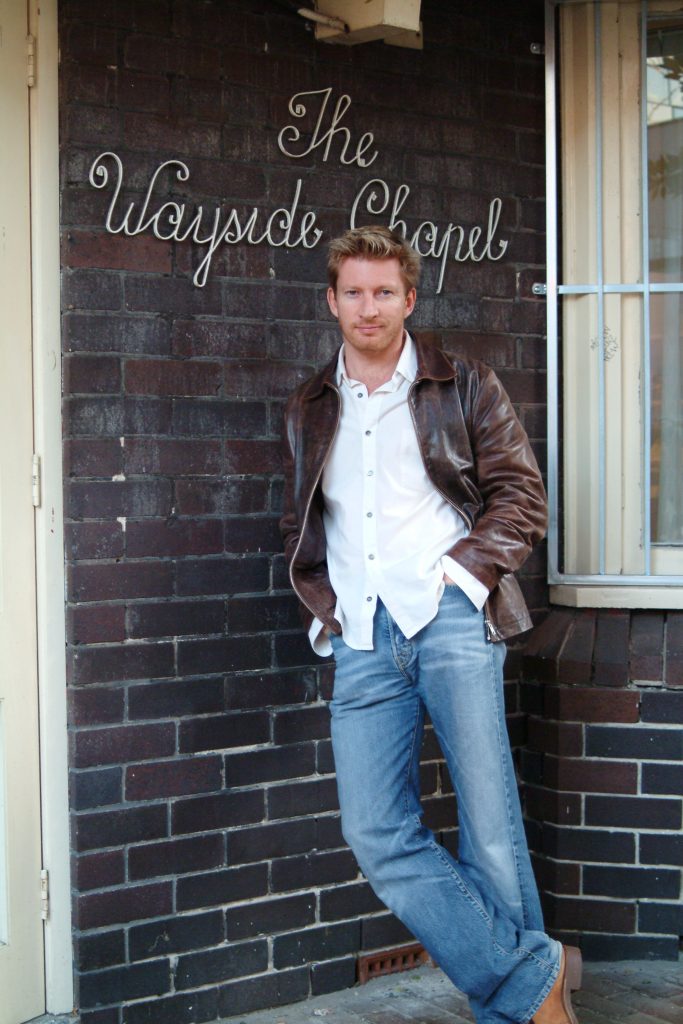
You’ve been a long-time supporter of the Wayside Chapel. Can you tell us more about that?
DW: I always think—what can you do? For me, it’s about think globally, act locally. I lived down the road from Wayside, so when they asked me to get involved, it made sense. When I first became an ambassador, the building was about to be condemned. Now, thanks to Graham Long and the fundraising efforts, it’s thriving. It’s the shining beacon of Kings Cross.
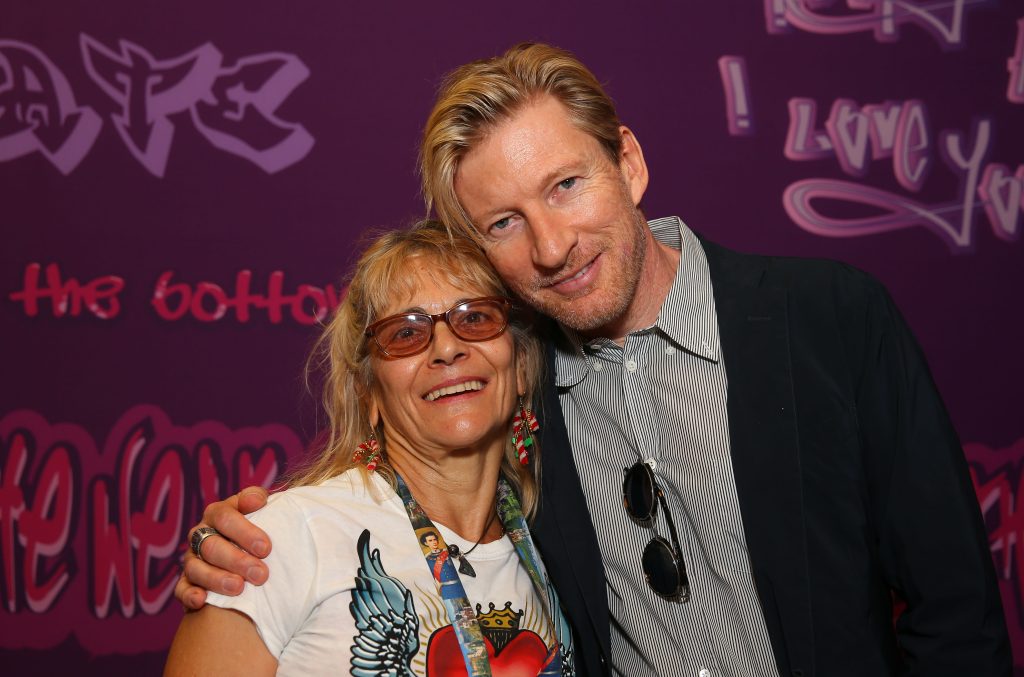

Jumping genres—what was it like playing someone as deceptive as your character in Fake? Quite different to Johnny.
DW: Oh, incredibly different. And really difficult. Every day, we had to fine-tune the script to ensure he wasn’t just a two-dimensional villain. If he was just a hideous person, you’d be wondering why Birdie kept going back. The challenge was finding enough nuance to make that dynamic believable. It was one of the most technically demanding roles I’ve ever played.
Funny you say that—there was a lot of debate in our office about whether Birdie should’ve stayed or run for the hills.
DW: I bet. But you’d be surprised how many women have come up to me after Fake and said, That exact thing happened to me. Smart, capable women. It’s a fascinating psychological space.
You’ve played so many diverse roles, but three-quarters of Australia still has a soft spot for Diver Dan. How do you feel about that?
DW: I love creating. That’s what drives me—being on set, playing, inventing. I rarely look back at my own work. The joy for me is in the making, not the watching.


You’re being inducted into the Australian Film Hall of Fame—congratulations! How do you feel about that kind of recognition?
DW: Look, it would have made my parents proud, knowing I did something I love and did okay at it. But beyond that, it’s really about celebrating Australian cinema. That’s what matters. And let’s be real—I’ve got a whole suitcase of modesty I carry around. If I were American, I’d probably be giving a very different answer right now
Suitcase of Modesty—that’s a fantastic phrase. Ever thought about writing?
DW: Hmm, yes, it is isn’t it? Maybe that’s my next film title. Suitcase of Modesty.
What are the last three songs you shazamed?
DW: Looking Out by King Stingray—love that. Spiegel im Spiegel—probably the most beautiful piece of music ever composed. And a bit of Max Richter, since he’s been touring. Oh, and Amyl and the Sniffers—they have the last track on the movie.


DP: It’s really been special to rebirth the Australian Film Walk of Fame in the heart of Randwick, especially after it fell dormant for about a decade. It’s an esteemed recognition in the heart of the community, and it’s become a really popular event again. We’ve attracted domestic and international stars which has been fantastic. David is a huge pull, and we’ve had Sigrid Thornton and Leah Purcell in recent years. The sky’s the limit, and we want it to get bigger and better every year.
DP: The culture is so strong. There are such strong voices and stories that are uniquely Australian, and Aussies love seeing themselves on the screen. We’re really proud of who we are.
DP: What is so special about the Ritz and The Australian Film Walk of Fame is that it’s right here in the heart of our community. It’s our local cultural hub, and it’s our connection to not only the country, but, by being able to bring international film stars here, to everywhere. We can showcase ourselves to the world from our funky little precinct, but also bring the world’s stories here, to us.
SPIT
In cinemas March 6th




